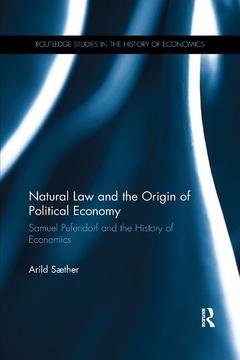Natural Law and the Origin of Political Economy Samuel Pufendorf and the History of Economics Routledge Studies in the History of Economics Series
Auteur : Saether Arild

Samuel Pufendorf?s work on natural law and political economy was extensive and has been cited by several important figures in the history of economic thought. Yet his name is rarely mentioned in textbooks on the history of economic thought, the history of political science or the history of philosophy. In this unprecedented study, Arild Sæther sheds new light both on Pufendorf?s own life and work, as well as his influence on his contemporaries and on later scholars.
This book explores Pufendorf ?s doctrines of political economy and his work on natural law, which was translated into several major European languages. Natural Law and the Origin of Political Economy considers the influence he had on the writings on political economy of John Locke, Charles Montesquieu, Jean-Jacques Rousseau, Francis Hutcheson and Adam Smith, amongst others. If Smith can be called the father of modern economics, this book claims that Pufendorf can be called the grandfather.
This volume is of great importance to those who study Pufendorf ?s extensive works, as well as those interested in history of economic thought, political economy and political philosophy.
Introduction
Part I: Childhood and Education
Childhood: Turbulent Times
- University Education in Leipzig and Jena
- A Creative Imprisonment in Copenhagen
- Academic Career
- A Champion of the Enlightenment
- Method of Analysis
- Theory of Human Behaviour
- Private Property and the Four-Stages Theory
- Theories of Value, Money and Trade
- The Foundation of States and Council Decisions
- Division of State Powers and Principles of Taxation
- A Great Popularizer
- John Locke an Admirer of Pufendorf
- The First French Followers
- Charles Montesquieu: A Great Philosopher
- Jean-Jacques Rousseau: A Political Thinker
- The First Economic Model Builders
- Gershom Carmichael brought Pufendorf to Scotland
- Francis Hutcheson a User of Pufendorf
- Pufendorf as a Predecessor of Adam Smith
- The Bedevilled Historians
- Have Economists Overlooked Pufendorf?
- Pufendorf the Grandfather of Political Economy
Part II: A True European
Part III: Doctrines of Political Economy
Part IV: Diffusion of Pufendorf’s Economic Ideas
Part V: Early French Philosophers and Pufendorf
Part VI: Scottish Followers of Pufendorf
Part VII: How could Pufendorf be Overlooked?
Arild Sæther is Professor Emeritus. He retired from University of Agder, Kristiansand Norway in 2011 and is now affiliated with Agder Academy of Sciences and Letters. Recently he received his Doctor of Philosophy (Dr. Philos) from the Norwegian School of Economics, Bergen. Previously he worked for two and a half years as a Professor of European Economic Integration in Maastricht, the Netherlands, and three years as Director of EuroFaculty Tartu-Riga-Vilnius. Sæther has published books on economic theory and a number of journal articles. For over twenty years his main area of research has been the history of economic thought.
Date de parution : 12-2019
15.6x23.4 cm
Date de parution : 05-2017
15.6x23.4 cm
Thèmes de Natural Law and the Origin of Political Economy :
Mots-clés :
Friedrich III; Artificial Societies; History of economic thought; King Gustav III; History of economics; Grotius; Historians of philosophy; Hugo Grotius; Samuel Pufendorf; Elementorum Jurisprudentiae Universalis; De Jure Naturae et Gentium; De Jure Naturae; Adam Smith; Jean Domat; Jean-Jacques Rousseau; Pufendorf’s Natural Law; state powers; Natural Law Work; taxation; Human Sufferings; political economy; Harsh Captivity; natural law; De Officio; King Karl XI; Pufendorf’s Works; De Officio Hominis; Pufendorf’s Theory; Natural Law Philosophers; Jean Barbeyrac; Roman German Empire; Natural Price; Empress Catherine II; Smith’s Sources; Jean Jacques Burlamaqui; Supreme Sovereignty



